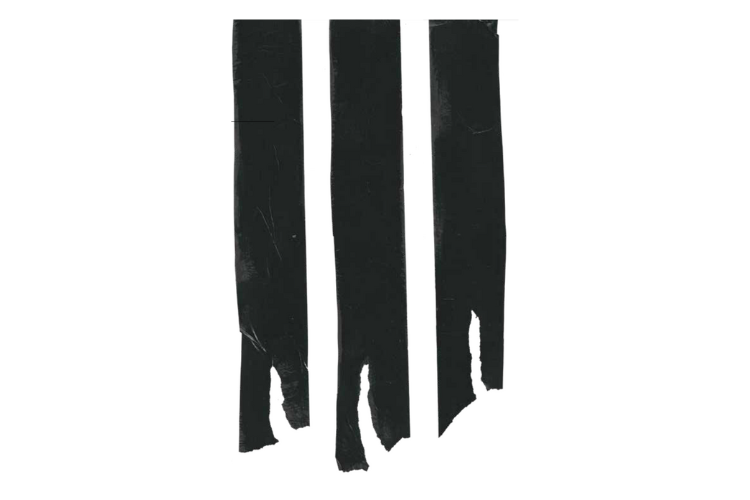
Art: Rebecca Katz, “Torn Shiva Ribbons”
Shiva

Get clear right away: he is going to die. There isn’t going to be any “beating this” or “surviving the odds.”
Get comfortable now with the fact that he will disappoint you—more than you ever thought possible. There’ll be no chance for him to redeem the past or to apologize for the ways he made you doubt yourself. Accepting that will always feel like trying to stuff something huge into a too-small bag. You can’t believe it doesn’t fit. Stubbornly, you try, but you’ll never be able to get it in.
One day you may be faced with some other agonizing life circumstances, but this will still stand out among them. Your parents dying is trumped only by your children dying, and there’s no need to waste your time thinking about burying a child you don’t have yet. Leave that morbid fantasy aside; you’ve got enough on your plate.
A lot of this is going to be about waiting. You will wait for test results, doctor appointments, MRIs, PET scans, CT scans, blood cell counts, explanations of benefits, available infusion chairs, new treatment plans, discharge orders, bags of chemo, nurses to find a good vein, nurses to get other nurses who are better at finding good veins, prescriptions. Get good at doing things that make waiting easier. The coffee, snacks, and magazines in the hospital are always terrible, so bring your own, and hospitals are always cold, so always have a sweater and a scarf.
Understand that the doctors don’t know shit. They can give you “answers,” but cancer behaves however it wants. They can see patterns in petri dishes and under microscopes, they can observe patients who respond in particular ways to treatments, or who don’t respond at all. They have a lot of information, and they want to know, to heal, to fix. But that doesn’t mean that they do, or will, or can. They might say “steroid treatment could make him jumpy or sleepless.” They will not be there when he comes home from a manic shopping spree with five pairs of shoes and three raincoats after yelling at the salesgirl at Macy’s. They don’t know how he’s going to die, when he’s going to die, or what will happen when he does.
There is no “prepared.”
Maybe a nurse can help you. The good ones, the smart ones, the kind ones know that sometimes there isn’t shit you can do except pay attention and try to make him a little less miserable. When they help you through the gnarliest moments, remember to say thank you. Those moments pass quickly, and then you will forget whether it was Amelia or Kathy or Susan who figured out that those two extra pillows under his left shoulder made all the difference. And he won’t be able to, so say “thank you.”
Though he is dying, he’ll be the same confounding man. Work will come first. His patients will be the priority. When you or your mother urge him to refer these patients to other doctors, he will yell that you don’t understand. How could he do that? For many of them, their relationship with him is a primary one! Months later, he will come home and cry to your mother that he fell asleep during a session, the medley of medications getting the better of him for the first time, his deterioration finally at the point where to not acknowledge it to his patients would be negligence. He will break the news carefully to them, shepherding them through the loss of their psychoanalyst. But he will yell at you when he thinks you’ve told your friends that he is sick. You want to tell him that yours is also a primary relationship; you need shepherding too.

People will keep telling you that he is doing his best. You will wrestle with that phrase for a long time, because it won’t feel like he’s made any effort to do anything for anyone, let alone himself. Someone once said that yes, people are always doing their best, but sometimes their best is shit. So maybe he will do his best and maybe his best will be shit. You may need a lot of wine and cigarettes while you watch your father take no interest in what he will leave you when he’s gone. Maybe the idea that he is doing all he can will help you. Maybe.

Take the things that you want when he isn’t looking. Take the keys to the country house. Go there and relax by the lake and think about how he loved the view, how he loved to swim. Take his old books. Take photos. There is a great one of you on his back in the pool, swimming to the deep end at your grandparents’ bungalow. Put it somewhere safe in your apartment. Take his marked up Psychoanalytic Quarterlies, his old Lotto tickets. Check the numbers. Maybe you’ll find a surprise—a ten dollar payout, a question or a reminder scrawled on the back in his strong, looping handwriting. He will keep asking you to go down to the bodega to buy them. Do it. Indulge his one irrationality while he’s still here. Keep wine and Chinese food and bagels and butter in the house even when he can’t eat. For now, it is just fine to waste food.
Try to ask him questions. He won’t give you answers, but try. You won’t get another chance. What was it like to go to preschool in demolished Warsaw? What was it like to come to America on a boat in the 1950s? What did it feel like to marry the Black woman your parents forbade you to? You think you know what it is like to have “no relationship” with your father, but trust that it will be quite different when he is gone.
You will need other people to help you. Don’t do what he will do—barricade himself alone in the bed with his pain, accompanied only by CNN droning on twenty-four hours a day, refuse to see his friends, or leave the house on a clear, bright day. If you lock yourself in your apartment and chain-smoke and let the voicemails pile up and eat donuts washed down with wine, fall asleep on the couch in front of documentaries, get up the next day and go back to your parents’ house to wash his soiled underwear and dole out oxycodone pills, it will be harder.
So answer the phone. Don’t be afraid to sound boring or angry and say that he is getting worse or no, it is the same or I am not fucking okay. He is your father and he is on his way out, and trying to maintain his fiction that we’re going to beat this is the hardest thing you will ever do. Other people should be there for the moments that you stumble, breathless at the enormity of it all.
There will never be anything but the words of others to tell you that he loved you, he was proud of you, so you just have to decide to believe it. It is the truth. Know now, there will never be that moment where he cries and strokes your hair and tells you that you are his princess and he loves you best and believes in you. He will criticize you until the end. He will tell you that you are fat and that you have gained weight, with no regard for why. It will shock you that as he wastes away the only sorts of things he’ll say to you are aren’t you still exercising? or do you know how many calories are in that glass of wine? Instead of breaking your heart, let it make you ragingly angry. Try to muster pity for him. That doesn’t feel good, but it’s better than shame.
Everyone else’s parents are dead or will die, so there’s a world of bullshit and platitudes created to help us cope. None of it helps on the terrible days that you will have to drip the morphine syrup into Gatorade and bring it to him with a straw, or when the doctor asks him who you are and he won’t know, or when they bring the hospital bed to the house.
No words will help three days later when you answer your mother’s call and arrive to see his cooling body stiffening in that bed. You will help the undertaker zip him into the black bag. You will wheel him on a gurney down the hall to the elevator. You will squeeze in with him tipped at a sharp angle, your shoulder pressed against his body to prevent him from slipping, and help roll him out to a van double-parked outside.
You will get through this and all the other shit that will come at you on the way to his death. All the regular stuff—bills you can’t pay and a boyfriend who will leave, and sprained ankles and mice you can’t get out of your tiny kitchen.
There is always a lot of work ahead.
Kyla Kupferstein Torres is a writer and editor in Oakland, California and a member of Lilith’s second New 40 cohort.


